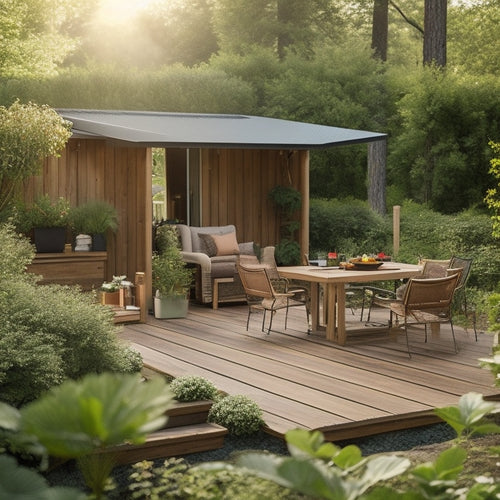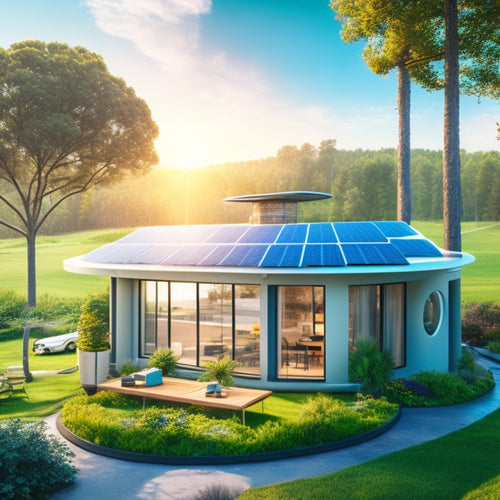
5 Water-Saving Irrigation Sensors for Green Homeowners
Share
You're likely overwatering your lawn, wasting up to 50% of the water used for irrigation. To optimize your irrigation system, consider integrating water-saving sensors that track real-time soil moisture levels, adjust to local climate conditions, and prevent overwatering. Advanced sensors can detect temperature, evapotranspiration, and rainfall to fine-tune your watering schedule. With automated irrigation schedule optimization tools, you can skip unnecessary watering cycles and reduce water consumption. By incorporating these sensors into your irrigation system, you can achieve ideal soil health, reduce energy consumption, and support sustainability. Now, uncover the top 5 water-saving irrigation sensors to take your green thumb to the next level.
Key Takeaways
- Soil moisture sensors detect exact water needs, preventing overwatering and reducing waste by up to 20%.
- Rain gauges adjust irrigation schedules based on real-time precipitation data, minimizing unnecessary watering.
- Temperature probes regulate water flow according to temperature, ensuring optimal irrigation for specific crops.
- Evapotranspiration sensors measure crop water requirements, optimizing irrigation for maximum efficiency and water savings.
- Smart irrigation controllers with automatic shut-off features prevent leaks and overwatering, ensuring responsible water usage.
Soil Moisture Monitoring Made Easy
When it comes to enhancing irrigation systems, monitoring soil moisture levels is crucial, and with advanced sensors, you can now do so with ease. By tracking soil moisture levels in real-time, you can adjust your irrigation techniques to guarantee ideal soil health.
Overwatering can be detrimental to soil health, leading to erosion, nutrient depletion, and reduced plant growth. The adoption of renewable energy solutions in irrigation systems can also reduce energy consumption and lower utility bills.
Advanced sensors allow you to fine-tune your irrigation systems, providing the exact amount of water needed. This not only saves water but also reduces energy consumption and lowers your utility bills.
With precise monitoring, you can make data-driven decisions to enhance your irrigation systems, resulting in healthier soil, reduced waste, and a more sustainable future.
Weather-Based Irrigation Automation
The local climate plays an essential role in determining the ideal irrigation schedule for your crops. By considering temperature, precipitation, and evapotranspiration rates, you can optimize your irrigation system to minimize waste and maximize yields.
Implementing a hybrid approach solar-powered energy solutions can also contribute to energy efficiency and reduce your carbon footprint. Weather-based irrigation automation uses real-time climate data to adjust your irrigation schedule, ensuring that your crops receive the right amount of water at the right time.
This approach greatly reduces the climate impact of irrigation, conserving water and energy while maintaining irrigation efficiency. With automated weather-based irrigation, you can enjoy the freedom to focus on other aspects of your garden while knowing that your crops are receiving the precise amount of water they need.
Sensors for Precise Watering Control
Soil moisture sensors, rain gauges, and temperature probes form the backbone of precise watering control, providing real-time data on soil conditions, precipitation, and temperature fluctuations. You can use this data to optimize your drip irrigation system, ensuring that your plants receive the right amount of water at the right time.
| Sensor Type | Function | Benefits |
|---|---|---|
| Soil Moisture | Measures soil water levels | Prevents overwatering, reduces waste |
| Rain Gauge | Measures precipitation | Adjusts irrigation schedule accordingly |
| Temperature Probe | Measures temperature | Regulates water flow based on temperature |
| Evapotranspiration (ET) | Measures water loss | Optimizes irrigation for specific crops |
| Soil Temperature | Measures soil temperature | Enhances seed germination and growth |
Irrigation Schedule Optimization Tools
Fine-tune your irrigation schedule with advanced optimization tools that pinpoint the perfect watering window, guaranteeing your crops receive exactly what they need, when they need it.
These tools analyze real-time weather data, soil moisture levels, and crop water requirements to create a customized irrigation plan. By optimizing your watering schedule, you'll achieve maximum irrigation efficiency and reduce water waste.
Conservation strategies, such as skipping unnecessary watering cycles or adjusting watering times, can also be implemented. With optimized irrigation scheduling, you'll enjoy significant water savings, reduced energy consumption, and a healthier, more resilient environment.
Additionally, responsible waste management practices, such as recycling facility setup, can also contribute to a more sustainable future.
Moreover, understanding costs, like hazardous waste disposal fees, guarantees regulatory compliance and minimizes environmental impact.
Real-Time Water Usage Tracking
By analyzing your irrigation schedule, you've taken the first step towards water conservation. Now, it's time to take it to the next level with real-time water usage tracking. This feature, available in smart irrigation technologies, allows you to monitor your water consumption in real-time, making it easier to identify areas for improvement. With real-time data, you can adjust your water conservation strategies on the fly, ensuring you're not wasting a single drop.
| Water Conservation Benefit | Smart Irrigation Feature |
|---|---|
| Reduced water waste | Automatic shut-off in case of leaks or overwatering |
| Optimized irrigation cycles | Real-time soil moisture monitoring |
| Increased water efficiency | Personalized watering schedules based on weather data |
Frequently Asked Questions
Are Water-Saving Irrigation Sensors Compatible With Existing Irrigation Systems?
You won't believe how seamlessly most water-saving irrigation sensors integrate with your existing system - it's a breeze! You'll simply swap out old sensors or add new ones, making irrigation upgrades a walk in the park, ensuring sensor compatibility and effortless eco-friendliness.
How Do I Calibrate My Soil Moisture Sensor for Accurate Readings?
To guarantee accurate moisture measurement, you'll need to calibrate your sensor using techniques like reference testing and field validation, following the manufacturer's guidelines to optimize sensor calibration for reliable readings and precise water management.
Can I Integrate Irrigation Sensors With My Smart Home System?
You can seamlessly integrate irrigation sensors with your smart home system, leveraging smart technology to automate water management and optimize eco-friendly solutions, ensuring a harmonious balance between convenience and sustainability.
Are Water-Saving Irrigation Sensors Resistant to Outdoor Weather Conditions?
While you're sipping coffee on your sunny patio, your irrigation sensors are braving the elements - thankfully, they're built with sensor durability and weatherproof materials, so you can relax, knowing they'll withstand rain, snow, or scorching heat.
Do Irrigation Sensors Require Frequent Battery Replacements or Maintenance?
You'll be pleased to know that modern irrigation sensors often boast impressive battery longevity, typically lasting 5-10 years, and require minimal maintenance; following simple tips like cleaning the sensor and checking battery levels guarantees top performance with minimal hassle.
Related Posts
-

3 Best Solar-Powered Biodegradable Accessories for Your Home
You're taking a significant step towards a more sustainable lifestyle by incorporating solar-powered biodegradable ac...
-

Green Deck Options: Earth-Conscious Choices for Your Home
You're looking for a deck that not only enhances your home's exterior but also aligns with your eco-friendly values. ...
-

Gamify Your Home's Energy Generation and Savings
You're taking the next step in optimizing your home's energy generation and savings by utilizing the power of gamific...


